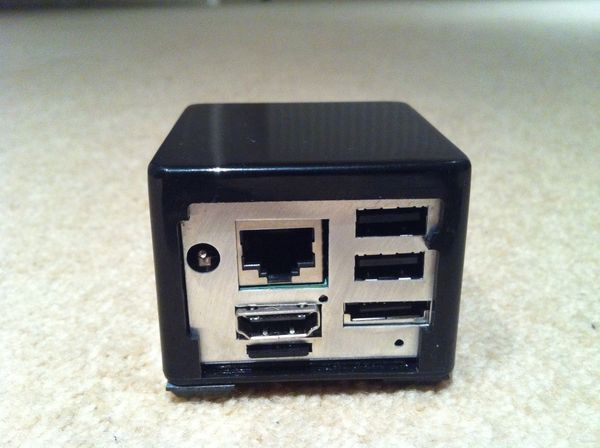HCL:CuBox
The CuBox is a high performance mini computer/media center usable as an open source development platform. Besides its tiny size of only 2 cubic inches it is also very energy efficient using only less than 3W power.
Technical Data
- ARMv7 running up to 800MHz
- 1GByte, 32 bit, 800MHz Data Rate DDR3.
- One 10/100/1000 Ethernet Port
- 2 High Speed USB Ports, 1 microUSB (usable as serial port)
- 1 HDMI Output Port (with CEC support)
- 1 Optical SPDIF Output Port
- MicroSD storage (up to 64GB)
- One eSATA Port Supporting both Gen-1 and Gen-2
- Infra Red Receiver with LIRC software support
- 5V/2A power supply (consumption is much less if no USB devices are connected)
- Dimensions ~ 55mm x 55mm x 42mm
Writing a disk image to the SD card
- Download the image you want (Leap is stable, Tumbleweed is rolling) from here:
 Tumbleweed
TumbleweedJeOS image If the direct links above do not work for you, please check the general download directory for the images.
 Leap-15.3
Leap-15.3JeOS image If the direct links above do not work for you, please check the general download directory for the images.
- As root extract the image onto your SD card (replace sdX with the device name of your SD card).
WARNING: all previous data on the SD card will be lost. Check first if the device you have selected is really your SD card!xzcat [image].raw.xz | dd bs=4M of=/dev/sdX iflag=fullblock oflag=direct; sync
- Insert the SD card with the openSUSE image into your board.
- Connect the board to your PC via serial port (optional, but helpful for debugging; USB-TTL serial cable needed).
- Connect the board to your monitor (via DVI/HDMI, optional).
- Power on the board.
- Walk through the first boot steps.
- Ethernet is configured to request an IP via DHCP, check your DHCP server for the board IP if used.
- Have a lot of fun...
Default login is root:linux, works on serial console, via ssh, GUI.
Known Issues
- no video output (drivers not upstream)
- YaST looks horrible in screen over serial console, workaround, zypper install putty ; putty -serial -sercfg 115200,8,n,1 /dev/ttyUSB0
